In Print
About Andrew Cusack
 Writer, web designer, etc.; born in New York; educated in Argentina, Scotland, and South Africa; now based in London.
Writer, web designer, etc.; born in New York; educated in Argentina, Scotland, and South Africa; now based in London. read more
News
Blogs
Reviews & Periodicals
Arts & Design
World
France
Mitteleuropa
Knickerbockers
Argentina
The Levant
Africa
Cape of Good Hope
Netherlands
Scandinavia
Québec
India
Muscovy
Germany
Academica
What You Should Read
Three recommendations and some honourable mentions
Over at ISI’s Intercollegiate Review, there’s a post by Joseph Cunningham suggesting eight publications you should be reading. In September I came up with a handful of suggestions of what blogs or websites readers ought to take note of, particularly if they exist in the Catholic/traditionalist/conservative realm so difficult to sum up in a single word or term.
Of course, most of what you should be reading is by dead people (suggestions of who I proffered herein, including some actually alive), but while Chesterton described tradition as the democracy of the dead we would be remiss to carry forth in ignorance of the living.
Publications wise, then, what is the well-read gent, or lady, reading? I’ve judged this question by what I’ve managed to persuade/force/intimidate my friends into subscribing to or buying, as well as by my own habits.
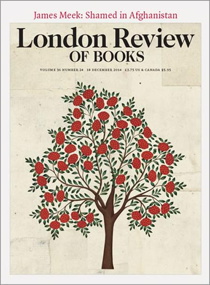
This fortnightly review is one of the last places where long-form essays are still the norm. One of the adventures of starting to read a piece in the LRB is that one has no idea whether it will continue for two of the Review’s large pages, or six, or maybe more. In addition to intellectual essays it also contains occasional reporting from Patrick Cockburn, arguably the best journalist reporting on the Middle East today. (You can read my review of Cockburn’s latest book over at Quadrapheme.)
Is it left-wing? Unquestionably. But if you’re only reading what you already agree with, you’re missing the point. Your principles should be strong enough to face challenges, or to be informed by them, and the ability to separate the wheat from the chaff is the most necessary task for any thinking person.
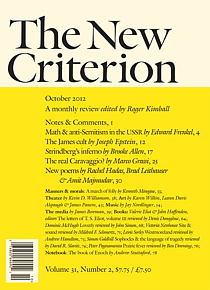
This American monthly came in for a lot of flak from a lot of conservative intellectuals for propagating and defending the neo-con support for the Iraq War, but the Daily Telegraph’s description of The New Criterion as ‘America’s leading review of the arts and intellectual life’ remains true to this day. (Disclosure: I was an editor at TNC from 2006-2008.) Feature articles are informative and expanding, the book reviews provide a good guide for reading, and art-wise I’ve always admired the clean prose of James Panero’s Gallery chronicle.
In recent months New Criterion readers have had the privilege of learning about the Jesuit linguist Albert Jamme’s hatred for sleep — “I hate my bed because it keeps me from my texts!” — and a Duke of Mantua’s expensive interest in female dwarves while last year they published the Quaker pacifist classical scholar Sarah Ruden on the darker side of Mandela’s government. Worth reading every month.
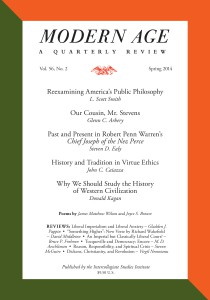
Founded in 1957 by Russell Kirk — the greatest St Andrean of the twentieth century — Modern Age is an academic journal which Wikipedia describes as ‘traditionalist, localist, against most military interventions,’ as well as critical of neo-conservatism and generally sympathetic to religious orthodoxy.
Its archive over the past sixty years provides articles and essays of great value by Erik von Kuehnelt-Leddihn, Virgil Nemoianu, Lee Congdon, Pierre Manent, and others. Take, for example, Lee Congdon on ‘Conservatism, Christianity, and the Revitalization of Europe’.
A rewarding, more scholarly read, with footnotes that will lead you elsewhere.
These three will prove worthwhile reading for any intellectual of sound principles, but are there any other honourable mentions?
My weekly workplace reads are The Spectator and The Economist which are useful for keeping tabs on things in general.
I have to admit I do read Monocle every month. While it’s aimed at wealthy jetsetters rather than our own constituency of cosmopolitan conservatives living in genteel poverty the magazine nonetheless combines an exacting stylistic excellence with an admirably broad focus.
First Things I would read every month but it doesn’t seem to be available anywhere in London except by subscription.
Two or three times a year I pick up The Art Newspaper, another superbly put-together periodical. Fr Christopher Colven of St James, Spanish Place, writes for it often, as it happens.
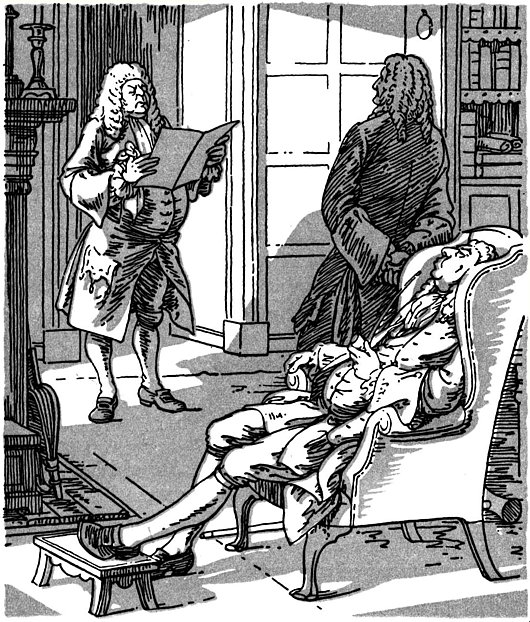
Stefan Beck Online
 Fans, foes, and other followers of that favoured son of Granby, Mr. Stefan M. Beck, can track his hoots, wails, and whinnies at this new locale. The site archives a number of Stefan’s writings as well as containing his food blog, where, most recently, you can investigate the Ulster fry. Past mentions of Beck can be found here, including my favourite mental image of “wearing a bearskin and sacrificing holly-crowned virgins to Wotan”.
Fans, foes, and other followers of that favoured son of Granby, Mr. Stefan M. Beck, can track his hoots, wails, and whinnies at this new locale. The site archives a number of Stefan’s writings as well as containing his food blog, where, most recently, you can investigate the Ulster fry. Past mentions of Beck can be found here, including my favourite mental image of “wearing a bearskin and sacrificing holly-crowned virgins to Wotan”.
Scottish Field

“He looked up from Scottish Field and all the colour, all the warmth of the world of those pages seemed to drain away.” So writes Alexander McCall Smith in The World According to Bertie, in which the eponymous minor’s enforced visits to the child psychiatrist at the command of his overbearing mother are made at least somewhat bearable by the freedom to flip through the pages of the magazine. Scottish Field is an institution, a staple of doctors’ waiting rooms and bed-and-breakfast sideboards, as well as acting as a Caledonian companion to Country Life and The Field (both of which are produced south of the Tweed, a world away). Your humble & obedient scribe even once graced the high-and-mighty social pages of Scottish Field, beside Lt. Col. Bogle and His Eminence the Cardinal Archbishop of St Andrews & Edinburgh.
Scottish Field recently underwent a bit of a redesign, which included a typographical change to its old-fashioned nameplate (often called a banner or, erroneously, the masthead). (more…)
A new look for The Walrus
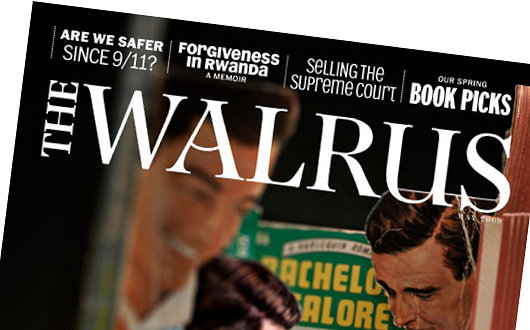
The Walrus is Canada’s general-interest magazine, a sort of New Yorker for the Great White North. Founded just a few years back in 2003, it has taken many of its visual cues from The New Yorker and the result has been a very handsome monthly and a surprisingly interesting one. That’s not to say that it’s a very interesting magazine (like The Spectator), but one which surprises with the occasional article of note. Canada’s intelligentsia is notoriously boring and liberal; they tend to sneer at the neighbouring United States while simultaneously attacking long-held Canadian traditions. For some reason, Canadian intellectuals have yet to comprehend that making Canada less British doesn’t make it more Canadian but instead more American because it is precisely Canada’s Britishness that distinguishes the Great Dominion from the republic to the south.
The Still Solid Spectator
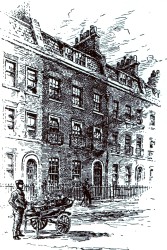 WHEN MATTHEW D’ANCONA took the helm as editor at the Spectator, worry surfaced. I had heard that he was something of a Blairite (though that is the trend amongst Tory bigwigs these days) and those worries were not allayed by the loathsome interjection in the beloved weekly of a ‘business’ section and the ambiguous ‘style and travel’ segment. These were most unwelcome changes; what would the late great Peter Simple have made of them? Nonetheless, the quality outwith those interlopers has not declined significantly, and despite the sad pleas of the Israeli ambassador, the ever-amusing Poor Little Greek Boy has not been given the boot.
WHEN MATTHEW D’ANCONA took the helm as editor at the Spectator, worry surfaced. I had heard that he was something of a Blairite (though that is the trend amongst Tory bigwigs these days) and those worries were not allayed by the loathsome interjection in the beloved weekly of a ‘business’ section and the ambiguous ‘style and travel’ segment. These were most unwelcome changes; what would the late great Peter Simple have made of them? Nonetheless, the quality outwith those interlopers has not declined significantly, and despite the sad pleas of the Israeli ambassador, the ever-amusing Poor Little Greek Boy has not been given the boot.
Nonetheless, the hopefully brief reign of that slatternly goddess Change is not yet finished, for the Spectator is moving from their legendary offices at No. 56 Doughty Street. The office, a few doors down from the home of Charles Dickens, has become reknowned for its lunches. When the Prince of Wales was invited, he specifically asked for the Poor Little Greek Boy and Jeff Barnard, but editor Charles Moore (a convert to Catholicism) declined the request. “Why not?” inquired H.R.H. “Because,” quoth Moore, “Jeff will use the F-word non-stop and the Greek boy will leak to the tabloids”. But, as Taki tells us in this week’s issue,
Doughty Street was home to the weekly for over three decades, before which it was edited from No. 99 Gower Street in Bloomsbury.
While the venerable Speccie is leaving a splendid, old building, thankfully it will not be emigrating to the dreary modernity of Canary Wharf but rather to 22 Old Queen Street in Westminster. “It’s a magnificent Georgian building, much bigger than the present one, with a beautiful garden,” d’Ancona told the Evening Standard. The garden happens to look out onto St. James Park, and so should prove quite adequate to hosting the Spectator‘s annual garden party.
Previously: Welcome to Doughty Street
A Scene at the Club
Punch, 28 July, 1920
I never liked Buttinbridge. I considered him a vulgar and pushful fellow. He had thrust himself into membership of my club and he had forced his acquaintance upon me.
I was sitting in the club smoking-room the other day when Buttinbridge came in. His behaviour was characteristic of the man. He walked towards me and said in a loud voice, “Cheerioh, old Sport!”
I drew the little automatic pistol with which I had provided myself in case of just such an emergency, took a quick aim and fired. Buttinbridge gave a convulsive leap, fell face downwards on the hearthrug and lay quite still. It was a beautiful shot—right in the heart.
The room was fairly full at the moment, and at the sound of the shot several members looked up from their newspapers. One young fellow—I fancy he was a country member recently demobilised—who had evidently watched the incident, exclaimed, “Pretty shot, Sir!” But two or three of the older men frowned irritably and said, “Sh-sh-sh!”
Seeing that it was incumbent upon me to apologise, I said, in a tone just loud enough to be audible to all present, “I beg your pardon, gentlemen.” Then I dropped the spent cartridge into an ash-tray, returned the pistol to my pocket and was just stretching out my hand to touch the bell when old Withergreen, the doyen of the club, interposed.
“Pardon me,” he said, “I am a little deaf, but almost simultaneously with the fall of this member upon the hearthrug I fancied I heard the report of a firearm. May I claim an old man’s privilege and ask if I am right in presuming a connection between the two occurrences, and, if so, whether there has been any recent relaxation of our time-honoured rule against assassination on the club premises?”
Shouting into his ear-trumpet, I said, “I fired the shot, Sir, which killed the member now lying upon the hearthrug. I did so because he addressed me in a form of salutation which I regard as peculiarly objectionable. He called me ‘Old Sport,’ an expression used by bookmakers and such.”
“Um! Old Port?” mumbled old Withergreen.
“Old Sport,” I shouted more loudly. Then I stepped to the writing-table, took a dictionary from among the books of reference, found the place I wanted and returned to the ear-trumpet.
“I find here,” I said, for the benefit of the room at large, for all were now [pg 75] listening, though with some impatience, “that in calling me a ‘sport’ the deceased member called me a plaything, a diversion. If he had called me a sportsman, which is here defined as ‘one who hunts, fishes or fowls,’ he would have been not necessarily more accurate but certainly less offensive.”
At this point there stood up a member whom I recognised as one of the committee. “I am sure, Sir,” he said, “that all present are agreed that you fired in defence of the purity of English speech, and that the incident was the outcome of an unfortunate attempt to relieve the financial embarrassment of the club by relaxing our former rigorous exclusiveness. Speaking as one of the committee, I have no doubt that the affair will be dismissed as justifiable homicide.”
Having bowed my acknowledgments I rang the bell. When the waiter appeared I bade him “Bring me a black coffee and then clear away the remains of Mr. Buttinbridge.”
Then I was awakened by the voice of Buttinbridge yelling, “Wake up, old Sport!”
The Spectator

Welcome to Doughty Street
It is an eternal and reassuring fact of human nature that when an editor announces that he is stepping down from a great publication, there is not the slightest interest in what he plans to do with his life, or even who he was.
I have received many phone calls from friends and colleagues since announcing last Friday that this would be my last edition, and they only want to know one thing. ‘Who is taking over?’
I wish I knew myself. But since the white smoke has yet to go up, I thought I had better write a general welcome to whoever you are out there. I propose to open the door of 56 Doughty Street and show you — not so much how it’s done — but where it’s done.
You arrive at a big black door in Holborn with a brass plaque, and after you have gained admission, you find a scene of domestic chaos, with dog leads, umbrellas, champagne and other impedimenta. Immediately beneath a sign saying ‘No Bicycles’ you will notice several bicycles.
You will dimly glimpse other offices ahead and to your left, the Books and Arts and Cartoon departments, bulging with the greatest talents in journalism. But if you are like me, you will be overcome with nerves and scoot straight upstairs for your office, on the first floor. As soon as you walk in, your heart will lift.
It is a magnificent room, a huge Victorian drawing-room with a chandelier and three sash windows looking out on the street where Charles Dickens lived, with an assortment of furniture both distinguished and distressed.
As you walk to your desk you cross Ian Gilmour’s (editor 1954–59) carpet, a large, fine and extremely valuable Turkish rug. Occasionally in the last 50 years there have been peeps from Isleworth suggesting this carpet might be returned. You will find these suggestions increasingly easy to ignore.
You sit down at the colossal desk. You find a Black Museum of Spectator history. There is a fragment of red telephone box, rescued by Charles Moore (editor 1984–1990). There is a big yellow molar in a plastic thimble, apparently wrenched from the merry chaps of Frank Johnson (editor 1995–1999). There is a silver-plated statuette of a miner with pick and shovel, presented to ‘The Spectator’ by the townsfolk of Aberdare in 1929. ‘In grateful recognition,’ says the plaque, adding, ‘the greatest of these is love.’
Hear, hear, you say, and try the drawers. You will find the handles mainly broken, but in the bottom left is a fabulous cache of letters congratulating Dominic Lawson (editor 1990–1995) on acceding to your chair. You will by now be blizzarded with your own letters of congratulation, and in some cases you will have received the same letters, from the same people, offering the same columns!
Before you have time to recover, your hugely efficient PA will be patching you through to Downing Street, because the Prime Minister wants to congratulate you in person. You leave instantly, and have half an hour in the sofa room with Tony, during which he will extol the magazine and (quite properly) the genius of Paul Johnson.
If you do the job in the way that we all hope, that will be the last friendly contact you have with the regime. In due course, when Downing Street takes you to the Press Complaints Commission over a story that turns out to be 100 per cent right, you will have to keep your nerve. Old chums will turn up in your office, urging you to capitulate. Don’t.
The Spectator surrenders to no one. The Spectator is always right.
When you return from your audience you may be tired and cold, and I recommend that you light the gas fire. There are few sights more cheering than that fire on a winter’s day, though you should not forget to turn it off when you leave. I did, and the Nigerian security guy put it out with the fire extinguisher.
Once the fire is going well, you may find your eyes drifting to the lovely striped chesterfield across the room. Is it the right size, you wonder, for a snooze…? You come round in a panic, to find a lustrous pair of black eyes staring down at you.
Relax. It’s only Kimberly, with some helpful suggestions for boosting circulation. Just pat her on the bottom and send her on her way. Whatever you do, don’t get depressed if she starts saying ‘noos-stand is sawft this week, Booriss’ (she is American) or that she doesn’t like your cover. That’s her job, and if you put your back into yours you’ll find that news-stand has a way of gently recovering.
Just as you’re drifting off again, the phone goes. There are two phones on the desk, white and black. If it is the white phone, on your first day in the job, I would say it is a dime to a dollar that the caller is Bruce Anderson.
Now Bruce is a wonderful fellow and an excellent writer, but if you happen to tell him, after lunch, that you do not have space for a piece, he is apt to get morbid. ‘I will destroy you,’ he starts saying. ‘I will destroy you and your reputation for ever.’ Do not on any account take fright. He doesn’t mean it. The best thing is to blow kisses down the phone and commission a piece for the following week.
And then the phone goes again, and this time I would wager it is Taki, calling from Gstaad, full of good cheer and anxious to find out whether or not you are going to sack him. At this stage in your editorship the sacking or keeping of Taki is likely to be turned into a culture war of Dreyfus-like proportions.
The Guardian and other papers will start a horrible drumming roar for his dismissal. It is time, they say, that The Spectator showed it has moved on. Soon the whole of civilised London has joined in. Sack Taki! Sack Taki!
Faced with that overwhelming consensus, you have only one choice, though it is of course entirely up to you to decide what that is.
By now the day is drawing to an end, and it is time to see how everyone else is getting on. You stick your head round the next-door office, about a third of the size of yours, and occupied by three people and….Is that a dog? It is Harry, a highly intelligent and handsome Jack Russell, and certainly no smellier than anyone else in the building.
You go upstairs, past girlish giggles and shrieks emanating from the publisher’s office, and you pass other tiny offices, full of editors and computers and industry of all kinds, until you reach the dining-room.
Here you will pass many happy hours, some of them conscious. These are the very windows through which the magazine’s famous cook, Jennifer Paterson, threw the crockery into the garden of the National Association of Funeral Directors next door. This is the table where most of the copy-editing is done on Mondays and Tuesdays, expert hands and eyes buffing and polishing the contributions with the care of Amsterdam jewellers.
And then, last but not least, you go downstairs to pay homage to the advertising and production teams, who keep The Spectator awash with ads for handbags and help to pay your mortgage. Over time you will find that it pays to listen carefully to what they say, and oblige them as far as you can.
So ends the tour of the ancient distillery. The big black door slams behind you for the first time, as it slammed behind me for the last time this week. Thanks to the exertions of the brilliant team you inherit, the magazine is in the pink of financial health with circulation at an all-time high.
You will be urged to drag it ‘kicking and screaming into the 21st century’. But as editor of The Spectator you should not be tied to any particular decade, century, or even millennium.
You are a Time Lord, and your readers expect you to take them to all parts of the human experience, and to remember that the Bible and Homer are far more interesting and important, sub specie aeternitatis, than the price of oil or Tory prospects.
You will be told that the magazine is elitist, and you should take that as a compliment. Every society that we know of has been run by an elite, and every elite needs elucidation.
Every industry or profession needs an angel at the top of their Christmas tree, and in the case of journalism you hold that angel in your hands.
You will receive threatening letters from female journalists, urging you to have more female bylines, starting with their own, and I would not dream of advising you there.
You will find that our proprietors are little short of superb. They are cheerful, tolerant, wise, and eager to develop and improve the magazine.
I have a feeling that they are bluff enough not to mind the occasional laugh at their own expense, but I confess I have not had the nerve to find out.
Like everyone in a new post, you will probably have a tough first six months. You will then discover that you have, by some margin, the best job in London, and I have no doubt that you will have fun to a degree that is almost improper.
Dartmouth Craziness
The New Criterion‘s Stefan Beck (black iced coffee, no sugar) has an excellent little ditty in National Review on a little brouhaha up in Hanover, New Hampshire. It makes me somewhat glad that I go to a university where religion is generally met with the rolling of the eyes or a quick nap rather than modernist ire and indignation.
New Eyewitness Goes Blind
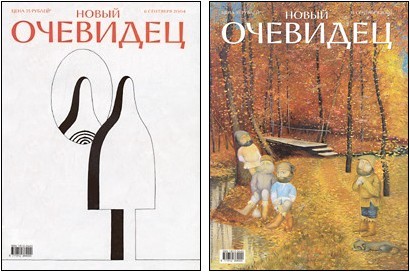
 Novy Ochevidets, Russia’s blatant imitation of the New Yorker is shutting down after only five months in operation, according to the Moscow Times.
Novy Ochevidets, Russia’s blatant imitation of the New Yorker is shutting down after only five months in operation, according to the Moscow Times.
Novy Ochevidets, which translates as the ‘New Eyewitness’, specially commissioned a Cyrillic font that fashioned after that of its mentor, and even had it’s own version (seen at right) of the New Yorker‘s classic fopp, Eustace Tilly.
I mourn for the New Yorker. It has yet to recover from Tina Brown’s years at the helm, and shows no signs of getting better. Indeed, quite the opposite, as was shown this past year when the magazine endorsed a political candidate for the first time in its history. (If you hadn’t already guessed, it was the man perenially described by James Taranto as ‘the haughty French-looking senator from Massachusetts who, by the way, also served in Vietnam’).
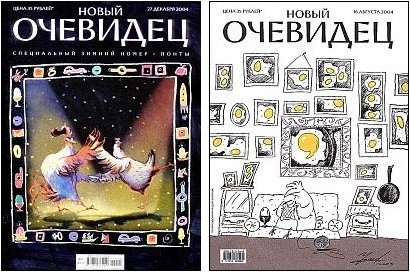
Via the indispensible Arts & Letters Daily.
Search
Instagram: @andcusack
Click here for my Instagram photos.Most Recent Posts
- Burns Tower April 19, 2024
- Patrick in Parliament March 18, 2024
- Articles of Note: 13 March 2024 March 13, 2024
- Cambridge March 9, 2024
- Taken on Trust March 4, 2024
Most Recent Comments
Book Wishlist
Monthly Archives
Categories


